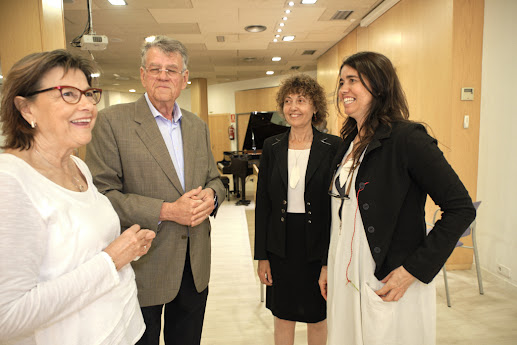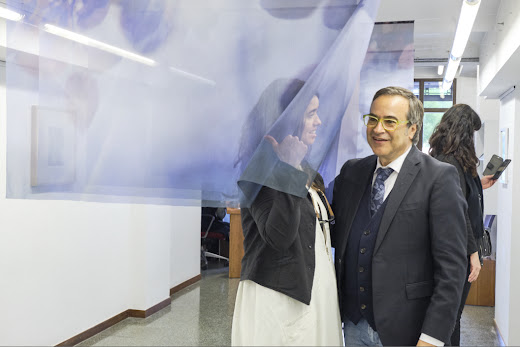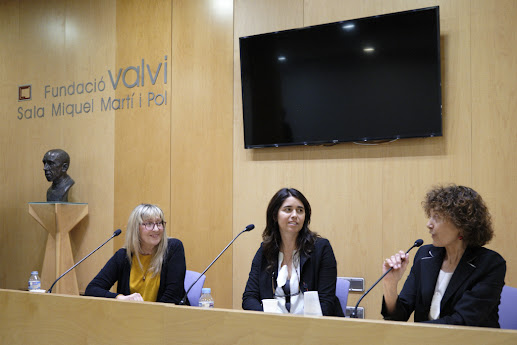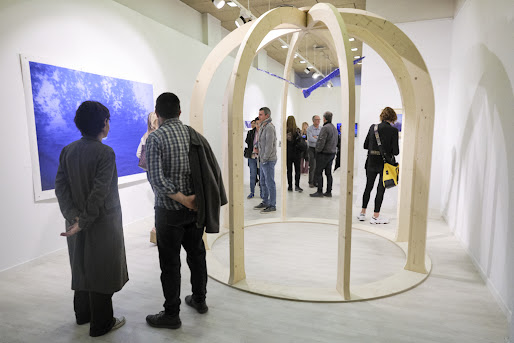Solo show
Art exhibition at the Valvi Foundation in Girona. All the art installations were interactive, everybody that visited the exhibition could play with them, the younger ones and the older ones. Here I am showing images of the opening.
www.fundaciovalvi.cat
Images of the inauguration
Photographs by Rafel Bosch
www.rafelbosch.cat
With the Vidal couple owners of Valvi Foundation and director Maguí Noguer
With the Art commissioner of the Andorran Government
Presentig Montse Miàs the composer of the music in the vídeo Ocells/Birds
Ester Xargay poet and writer, myself and Maguí Noguer director of Valvi Foundation
Presenting the exhibition
Marta and Vega from Magam, the creators of Once Upon A Territory Soundtrack
Montse Miàs, Maguí Noguer, me,Vega Montero, Marta Vila and Ester Xargay
Seeing if not among voices
Ester Xargay
"I like to confuse myself, to lose myself. I always play.
The game is good because it leads nowhere,
it simply consists of just going on."
Pere Noguera
In the photographs, the sea appears solid; if one looks closely, we will see how, from time to time, the seemingly contradictory - or rather, antagonistic and yet identical depending on how they are viewed (and this depending on how they contrast with the second in which they are looked at and depends on who looks at them) - shapes overlap, and the sea becomes a thick glass acting as a magnifying glass. Then, one can glimpse a courtyard, where Pere Noguera observes the rain splashing into a pool of reddish water, indicating that bird flights are reflected in the water, crossing a musical staff that drips. Now we explore these folds of life, behind the marine glass that writing represents, as a reflection of a presumed reality, while the text presents the epiphany of a space, suggested by Fiona Morrison, where forms contradict meanings through papier-mâché, trompe-l'oeil, and other artistic tricks; as poetry does, as Joan Brossa understands it: "a game where, under an apparent reality, another unexpected one appears." Therefore, it is in this poetic game where the joy of losing oneself lies, the gaze lost in the gaze, to find the intangible. And yet, it is not about a space but about an ongoing process, in which Fiona Morrison hunts the shadows of things that with her pieces freely exchange traits, highly acclaimed works for lovers of blue, green, white, stones, teddy bears, and round apricot seeds. She, bit by bit, leads us through landscapes, not at all grandiloquent, where we reflect like upside-down birches, evoking the beginning of a form of the beginning of bristles of a brush trained by a theoretical somersault, and butterflies flutter where everything they land on, among photographs, ceramics, woods, words, or papers.
Carles Hac Mor argues that: "there are moments when all the hours of all times converge before us in a space where all the spaces of the world also fit." Thus, if a squared chalk line on the ground will never imprison a beam of light, Fiona Morrison with a butterfly net will chase, in a jump and stop, what Hac Mor describes as "the spacetime we achieve in an instant that dilates as art does when it merges with our particular tempo and seems to agree with the space that awakens us to wakefulness within the dream.
With a sextant in hand, before dropping anchor, we raise a sea sheet over the day's neck and contemplate how darkness slips away when things arise incognito in the light of the secret that conceives them. And with Fiona Morrison, we rediscover that the star reigns over all effects, but cannot with time, which it dominates with a twist, and on the horizon it is reborn, in another hemisphere. A radiant turn that imposes the night where everything hides in full freedom, and in the moonlight the waves sparkle, brandishing their permanence. Joan Brossa lowers the sails: "behind the words the paper transforms / into the sea. And the letters into colorful fish." We drift, and Felícia Fuster throws us the lifeline, not sparing answers: "what sea step tightens the book of the voice / and this blue wine where I must read the fortunes / orphaned / abandoned / by the low tide." And so we return to port "with the unknown" quoting J.V. Foix: "Don't you always, when you go out to sea and forge ahead, see rocks that appear as giant frames, often strangely and mysteriously symmetrical?"









